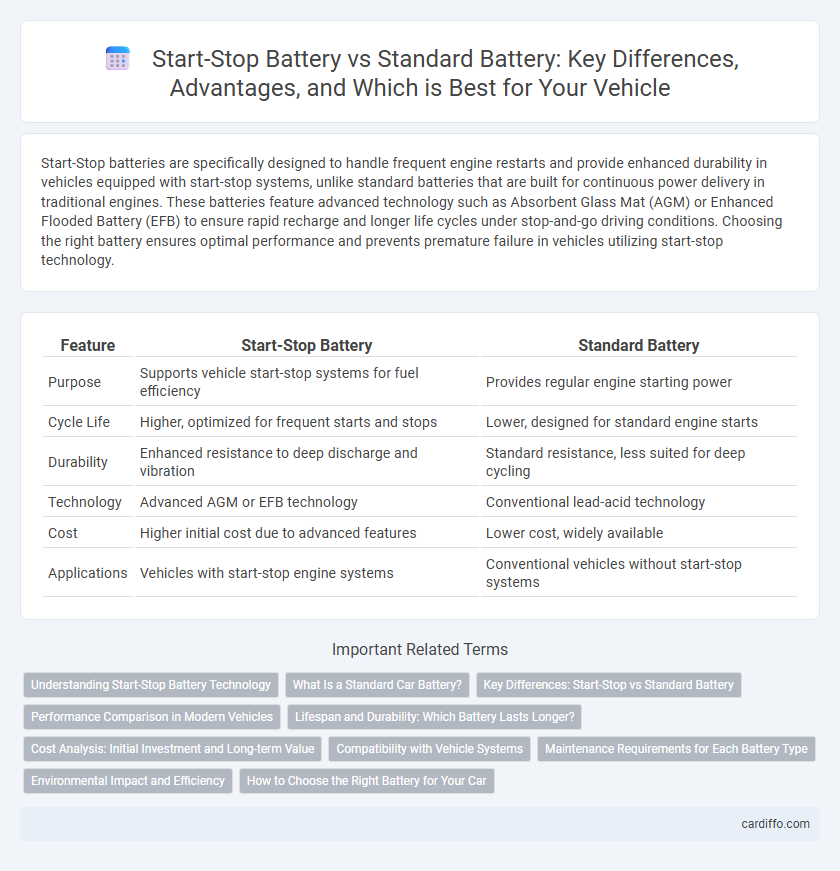Start-Stop batteries are specifically designed to handle frequent engine restarts and provide enhanced durability in vehicles equipped with start-stop systems, unlike standard batteries that are built for continuous power delivery in traditional engines. These batteries feature advanced technology such as Absorbent Glass Mat (AGM) or Enhanced Flooded Battery (EFB) to ensure rapid recharge and longer life cycles under stop-and-go driving conditions. Choosing the right battery ensures optimal performance and prevents premature failure in vehicles utilizing start-stop technology.
Table of Comparison
| Feature | Start-Stop Battery | Standard Battery |
|---|---|---|
| Purpose | Supports vehicle start-stop systems for fuel efficiency | Provides regular engine starting power |
| Cycle Life | Higher, optimized for frequent starts and stops | Lower, designed for standard engine starts |
| Durability | Enhanced resistance to deep discharge and vibration | Standard resistance, less suited for deep cycling |
| Technology | Advanced AGM or EFB technology | Conventional lead-acid technology |
| Cost | Higher initial cost due to advanced features | Lower cost, widely available |
| Applications | Vehicles with start-stop engine systems | Conventional vehicles without start-stop systems |
Understanding Start-Stop Battery Technology
Start-stop battery technology is engineered to support frequent engine ignition and shutdown, enhancing fuel efficiency and reducing emissions by powering vehicle electronics during these cycles. Unlike standard batteries, start-stop batteries use advanced lead-acid or AGM (Absorbent Glass Mat) technology to withstand deep cycling and rapid recharging demands. Vehicles equipped with start-stop systems rely on these specialized batteries to ensure reliability and longevity under high-stress conditions.
What Is a Standard Car Battery?
A standard car battery provides the necessary power to start the engine and operate electrical systems when the vehicle is off, relying on a lead-acid design with six cells producing around 12 volts. This battery type is designed for consistent, reliable performance in vehicles without start-stop technology, delivering a steady current for ignition and accessory functions. Compared to start-stop batteries, standard batteries typically have lower cycling capability and are not built to handle frequent engine restarts during driving conditions.
Key Differences: Start-Stop vs Standard Battery
Start-stop batteries are specifically designed to handle frequent engine starts and stops, featuring enhanced charge acceptance and durability compared to standard batteries. Standard batteries provide consistent power output for continuous engine operation but lack the advanced cycling capabilities necessary for start-stop systems. The key difference lies in the start-stop battery's ability to endure rapid recharge cycles and support vehicle energy demands during frequent ignition restarts.
Performance Comparison in Modern Vehicles
Start-stop batteries are engineered to withstand frequent engine restarts, providing enhanced durability and consistent power delivery in modern vehicles equipped with start-stop systems. Standard batteries typically offer reliable performance for continuous engine operation but lack the robust cycling capabilities necessary for frequent shut-offs and restarts. The advanced design of start-stop batteries results in improved fuel efficiency and reduced emissions by supporting the vehicle's automatic engine shutdown during idle periods without sacrificing performance.
Lifespan and Durability: Which Battery Lasts Longer?
Start-stop batteries, designed to endure frequent engine restarts, typically offer enhanced lifespan and durability compared to standard batteries by withstanding higher cycling demands. They utilize advanced materials and technology to resist wear, providing longer service life in modern vehicles equipped with start-stop systems. Standard batteries generally have shorter lifespans due to their inability to efficiently handle repetitive start-stop cycles, leading to faster degradation under similar conditions.
Cost Analysis: Initial Investment and Long-term Value
Start-Stop batteries typically have a higher initial investment cost compared to standard batteries due to advanced technology designed for frequent engine restarting and energy recovery. Over the long term, Start-Stop batteries often provide greater value by enhancing fuel efficiency and reducing emissions, potentially lowering overall vehicle operating costs. Standard batteries may offer lower upfront costs but lack the durability and efficiency benefits crucial for modern vehicles equipped with Start-Stop systems.
Compatibility with Vehicle Systems
Start-Stop batteries are specifically engineered to handle frequent engine restarts and are fully compatible with modern start-stop vehicle systems, ensuring optimal performance and fuel efficiency. Standard batteries, while suitable for conventional engines, often lack the durability and rapid recharge capabilities required for start-stop functions, potentially leading to premature battery failure. Compatibility with the vehicle's electrical architecture is critical, making Start-Stop batteries the preferred choice for vehicles equipped with advanced engine management systems.
Maintenance Requirements for Each Battery Type
Start-stop batteries require more frequent maintenance checks due to their advanced technology designed to handle frequent engine restarts, including monitoring electrolyte levels and ensuring proper charge cycles. Standard batteries generally need less maintenance, primarily focusing on periodic fluid level checks and terminal cleaning to prevent corrosion. Proper maintenance of start-stop batteries extends their lifespan and maintains vehicle efficiency, whereas standard batteries are more straightforward but may have shorter service life in high-demand conditions.
Environmental Impact and Efficiency
Start-stop batteries deliver improved fuel efficiency and reduced CO2 emissions by enabling engines to shut off during idling, unlike standard batteries that lack this capability. These advanced batteries are designed with enhanced charge acceptance and durability, supporting frequent engine restarts without significant efficiency loss. Consequently, start-stop battery technology contributes significantly to lowering vehicle environmental impact and optimizing energy use.
How to Choose the Right Battery for Your Car
Choosing the right car battery depends on your vehicle's engine type and driving habits, with Start-Stop batteries designed to handle frequent engine restarts, offering enhanced durability and charge acceptance compared to standard batteries. Start-Stop batteries utilize advanced lead-carbon or AGM technology to support the electrical demands of modern Start-Stop systems, while standard batteries are suitable for traditional engines with fewer power cycles. Evaluating factors such as battery capacity (measured in Ah), cold cranking amps (CCA), and compatibility with your car's electrical system ensures optimal performance and longer lifespan.
Start-Stop Battery vs Standard Battery Infographic

 cardiffo.com
cardiffo.com